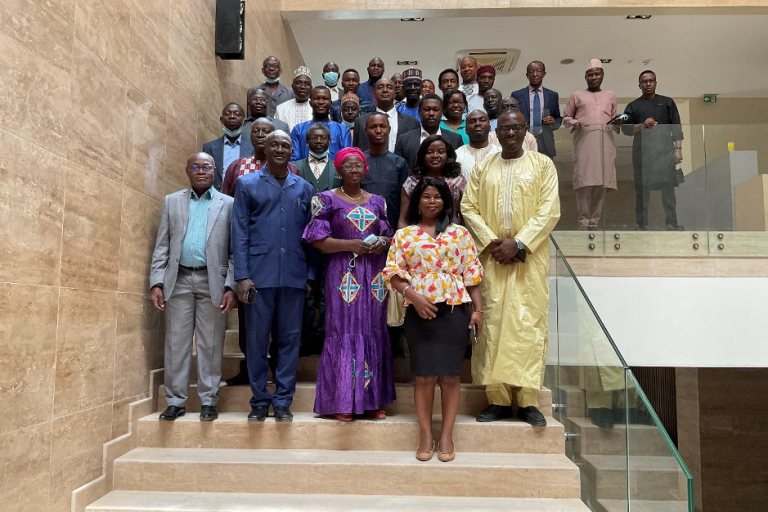Integrated water resources management and early warning system for climate change resilience in the Lake Chad Basin
The World Meteorological Organization WMO with its partners is preparing a project to establish hydrological monitoring and early warning system (EWS) for sustainable and fair water management and against water-related disaster risks like floods and drought in the Lake Chad basin. It seeks to improve water resource management for better climate resilience in the basin, which is severely affected by climate change.

The World Meteorological Organization WMO with its partners is preparing a project to establish hydrological monitoring and early warning system (EWS) for sustainable and fair water management and against water-related disaster risks like floods and drought in the Lake Chad basin. It seeks to improve water resource management for better climate resilience in the basin, which is severely affected by climate change.
WMO, the Lake Chad Basin Commission (LCBC) and the Global Water Partnership Central Africa (GWP-CAf) are partners in the project, with support from member countries (Cameroon, Central African Republic, Chad, Niger and Nigeria).
A pre-concept note on the project, “Integrated water resources management and early warning system for climate change resilience in the Lake Chad Basin” was approved by the Adaptation Fund in mid-2021. WMO will submit the concept note to the Adaptation Fund in spring 2022.
Climate change effects
Lake Chad basin is particularly vulnerable to climate change related extreme events such as floods and droughts and thus there is a huge demand and need for the proposed project.
Climate change will cause a rise in air temperatures in the region. Extreme events will likely become more abundant causing more frequent droughts and flooding with impacts on food security and general security in the region.
The proposed project activities aims to strengthen Hydromet infrastructures and services, human and institutional capacity. Outcomes of the project will be a better understanding of water resources for development and developed resilience to adapt/mitigate to climate change (related hazards) from community to governance level on sustainable basis.
Stakeholders feedback
A two-day regional workshop was held on 21-22 February 2022 in N’Djamena, Chad. The aim of the workshop was to install a dialogue among main stakeholders and get their and inputs to finalize the concept note. The project main beneficiaries in the Lake Chad basin countries include National Meteorological and Hydrological Services, disaster management organizations, regional organisations, non-governmental groups and communities. The event included over 30 participants present physically in Chad and over 30 participants online. LCBC was hosting the event locally.
Stakeholders gave valuable feedback on the importance of the project activities, for especially concerning communities and local level engagement for, e.g., fishers and farmers. They stressed the importance on consulting and associating vulnerable communities and averting community conflicts. Stakeholders underlined the commitment and the ownership of the countries for importance of sustainability of the project and also importance to include vulnerable groups, women, youth and local level actors to the project.
The workshop stressed the importance of efficient and targeted communications to inform on hydroclimatic events and risks and to take into account community level needs, importance of using different communication methods, including in local languages and using appropriate tools.
Project Objectives
The project “Integrated water resources management and early warning system for climate change resilience in the Lake Chad Basin” seeks to provide necessary hydrological basis for climate resilience and water resource management in the Lake Chad basin by providing practical guidelines and concrete technical solutions.
The main objectives are as follows:
• To build an effective water information system through establishing a consolidated network of national Hydromet observing systems that provide coherent and reliable data, transmitted in appropriate time to national and regional databases systems.
• To enhance meteorological and hydrological products and services through strengthening the technical and institutional capacities of the National Meteorological and Hydrological Services (NMHSs) related to data collection, processing, development of product based on user needs, and service delivery;
• To train and inform vulnerable communities on emerging risks such as floods and droughts, through strengthening the technical and institutional capacities of national services and developing an EWS to the main identified hazards;
• To facilitate the access, dissemination and use of products, services and tools relevant for water resource management, environmental protection and protection of human life and property against water-related risks;
• To strengthen regional and global cooperation through improved knowledge management of the Lake Chad and its tributaries to provide adapted climate and hydrometeorological services.
- WMO Member:
- Cameroon ,
- Central African Republic ,
- Chad ,
- Niger ,
- Nigeria









